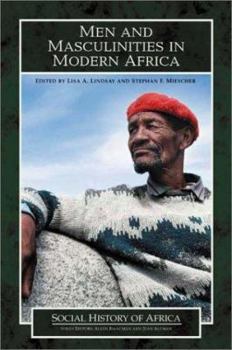Men and Masculinities in Modern Africa
Select Format
Select Condition 
Book Overview
This collection is the first to analyze the concepts and issues involved in exploring African men and the constructions of masculinity in sub-Saharan Africa. Major themes include men as gendered actors, the social construction of masculinity, masculinity as a relational category, and hegemonic and subordinate masculinities.
Format:Paperback
Language:English
ISBN:0325002541
ISBN13:9780325002545
Release Date:June 2003
Publisher:Heinemann Educational Books
Length:280 Pages
Weight:1.01 lbs.
Dimensions:0.8" x 6.1" x 9.2"
Customer Reviews
1 rating
African masculinity explored
Published by Thriftbooks.com User , 21 years ago
In this anthology, scholars juggle regional studies with men's studies. They question whether Connell's theories on masculinities can apply to the African continent. In exploring masculinities, they see four lines of inquiry: 1) the idea of the African "big man" is changing; 2) colonialism helped to shape African views on manhood; 3) independence struggles were gendered; and 4) the modern era has affected African masculinities.This book brilliantly discusses how Africans are subjects, rather than objects. Though whites, imperialists, and colonialists are brought up often, African wars, unionizing, bravery ceremonies, and other willful actions are emphasized. Though Foucault is never mentioned in this book, the idea that power is never absolute resounds clearly here.Though the editors very consciously view their work as lying within the men's studies field, in no way are women left out of the picture. The desire to find wives, keep wives, and be with wives is a continual staple of African manhood. See my discussion of female masculinity, infra. Further, men are not only distinguished from women, but from children, or what are called "junior men." The ability to pay for a child's education or for the building of a school in one's birth village helps to define masculinity often. This is not a unideminsional text: manhood is consistently matched with issues of age, wealth, marital status, parental status, and occupation.Traditional scholars should not be scared away from this book. Many academics may feel that masculinity is a nebulous topic that should be left for babbling postmodernists. However, this book would satisfy traditional scholars. The book discusses history, economics, and sociology in very concrete ways; it merely adds gender into the broader picture.From one-third to one-half of this book focuses on Nigeria. This may disappoint some. However, as the scholars are English-speakers, English-speaking African nations are probably the easiest place for them to study. Additionally, Nigeria is the most populous nation on the Continent. Still too, East Africa and Southern Africa are not forgotten.Only two of the contributors have African names. Forgive my indirect promotion of essentialism. I just think people should know in advance that the writers are talking about "them" and not "us." This work definitely felt much more arm's length than a "scholar from within" approach would have enacted.Unsurprisingly, "Africa" means sub-Saharan Africa here. Maybe postcolonial theorists have already agreed to lump North Africa with the Middle East. The surprise in the title comes from the word "Modern." Almost no article limits itself to the 1960s and afterwards/independence and its aftermath. Some articles reach back into the 18th century, let alone the height of the imperial age.The editors do wrestle with Judith Halberstrom's reminder that not only men practice masculinity. This anthology includes two entries on masculine women






